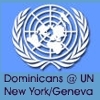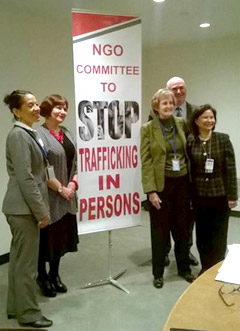

| BRIEFING - January 8, 2015 | To learn more about the Millenium Development Goals, click on the graphic Past Briefings: Dec 4, 2014 Nov 21, 2014 Oct 22, 2014 Oct 8, 2014 Sept 10, 2014 July 16, 2014 July 2, 2014 June 18, 2014 June 4, 2014 May 7, 2014 April 9, 2014 March 19, 2014 March 5, 2014 Feb 19, 2014 Jan 8, 2014 |
|
Trafficking in Persons: No Longer Slaves, I Call You Friends By Kelly Litt, Dominican Volunteer
In his recent message for the New Year, Pope Francis wrote against slavery and reminds the world that millions of people are still deprived of their freedoms and rights as they are forced to live in modern day slavery. Pope Francis explains:
Sixty-six years ago, the Universal Declaration of Human Rights proclaimed that “no one shall be held in slavery or servitude; slavery and the slave trade shall be prohibited in all their forms.” Yet human trafficking, the modern day form of slavery, has truly become a global issue. At the United Nations, both civil society and Member States are working together for an end to human trafficking and modern day slavery in all its forms. The United States Mission to the UN released its annual Trafficking in Persons Report for 2014. Alison Kiehl Friedman from the State Department explained that the report, themed “Journey from Victim to Survivor,” provides a diplomatic tool for greater government to government cooperation working toward the prevention of trafficking, the prosecution of traffickers, and the protection of survivors. With the ability to sell a human’s body over and over through sexual exploitation or organ harvesting or to contract them out for endless amounts of forced labor, begging, or armed conflict, the business of human trafficking is more profitable than drug trafficking; human beings are continuously being sold over and over again as if they were a mere commodity. It is estimated that there are between 27-29 million victims of human trafficking in the world today, yet there continues to be a decrease in victim identification despite the fact that 90 percent of countries have enacted legislation to criminalize trafficking. Shortly after the United States’ release of the 2014 Trafficking in Persons Report, the United Nations also released its annual UNODC Global Report on Trafficking in Person. Similar to the U.S. report, the United Nations report is a great resource that presents information on the patterns and flows of trafficking at all levels as well as how traffickers operate and what type of response is necessary to combat trafficking. These reports explain the necessity of tackling root causes and factors that lead to trafficking such as poverty, lack of equal opportunity, underdevelopment, and inequality. Both the United States Mission and the United Nations stressed the importance of involving survivors and incorporating their experience and voice when guiding and implementing policy changes. Pope Francis stressed that civil society organizations are tasked with “awakening consciences and promoting whatever steps are necessary for combating and uprooting the culture of enslavement.” Remembering the words of the Gospel in John 15, “no longer do I call you slaves… I have called you friends,” we must ensure that every person is recognized as a brother or sister of the human family and treated with dignity, shown respect, and given their full human rights. Human trafficking is a threat to security, development, and human rights. There simply is nothing human about human trafficking.
|
Dominican Leadership Conference
Building relationships and collaborating in the mission of preaching the Gospel
29000 West Eleven Mile Road
Farmington Hills MI 48336
248-536-3234 Contact: Executive Director
 Nelson Mandela once said, “To deny any person their human rights is to challenge their very humanity.” We are once again faced with this challenge, as Jan. 11 marks the National Human Trafficking Awareness Day in the United States and as Pope Francis similarly named Feb. 8 as the International Day of Prayer and Awareness Against Human Trafficking.
Nelson Mandela once said, “To deny any person their human rights is to challenge their very humanity.” We are once again faced with this challenge, as Jan. 11 marks the National Human Trafficking Awareness Day in the United States and as Pope Francis similarly named Feb. 8 as the International Day of Prayer and Awareness Against Human Trafficking. 